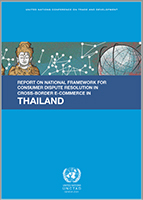
Thailand has made steady progress in its transformation to a digital economy. In addition to growth of the country's domestic e-commerce, its cross-border online trade is also rapidly increasing. However, this expanding e-commerce landscape has led to a rise in the number of online disputes.
Given the rapid technological advancement and the growth of international e-commerce transactions, the online dispute resolution system for consumers is becoming the most viable strategy for dealing with cross-border disputes. Moreover, cross-border e-commerce dispute resolution may be crucial for the inclusive growth of e-commerce in Thailand.
This study analyses Thailand’s national framework for resolving cross-border consumer disputes in e-commerce. It presents the current state of cross-border business-to-consumer (B2C) e-commerce in Thailand, including growth trends, market characteristics and actors, and existing operating models.
It also describes the existing legal and regulatory framework for resolving cross-border consumer disputes, focusing on private international law and consumer protection laws. It examines the institutional framework including judicial and administrative authorities. Finally, the report outlines the situations, systems and approaches to cross-border consumer dispute resolution that are currently in place or under development, focusing on their effectiveness and implementation.
The study concludes that there is room for improvement in Thailand’s e-commerce consumer markets, particularly in terms of effective consumer protection. This gap needs to be aligned with the regional direction set by ASEAN, which stresses the importance of strong consumer protection legislation. In addition, the report shows that Thailand’s consumer legal framework is fragmented, with numerous overlapping laws, agencies and organizations offering alternative dispute resolution mechanisms. Some private mechanisms have proved effective.
Thailand can encourage greater competition among private sector operators, especially online platforms, in providing ODR services to consumers. Regulatory responsibility for these private ODRs could be entrusted to the Office of the Consumer Protection Board or the Electronic Transaction Development Agency.
This report was prepared in the context of the UNCTAD technical cooperation project “Delivering digital trading infrastructure and online dispute resolution for consumers as means to improve international trade and e-commerce”.
The report provides policy makers with actionable recommendations that will help to improve crossborder B2C consumer dispute resolution and gives advice to the OCPB on the practical design and updating of the ODR platform.




